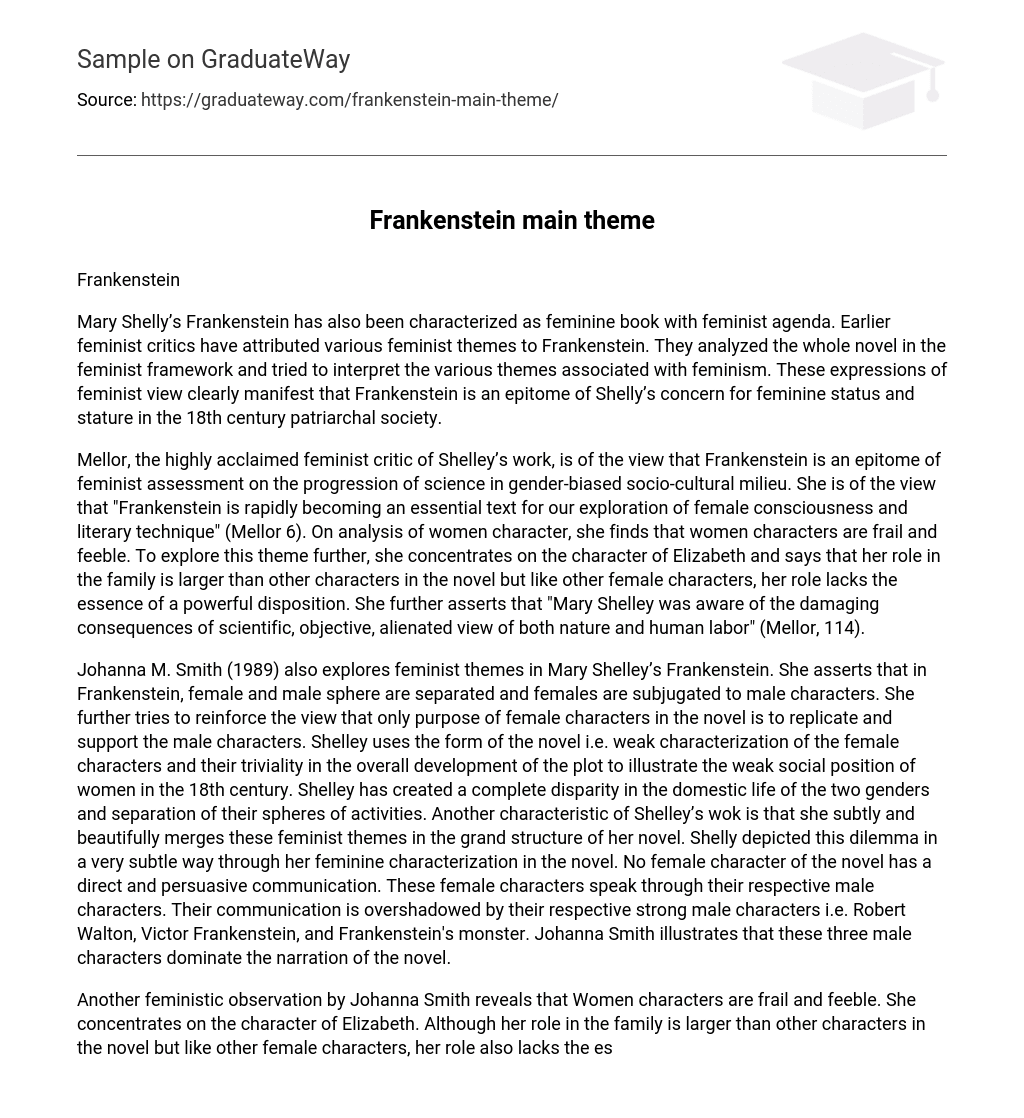Frankenstein
Mary Shelly’s Frankenstein has also been characterized as feminine book with feminist agenda. Earlier feminist critics have attributed various feminist themes to Frankenstein. They analyzed the whole novel in the feminist framework and tried to interpret the various themes associated with feminism. These expressions of feminist view clearly manifest that Frankenstein is an epitome of Shelly’s concern for feminine status and stature in the 18th century patriarchal society.
Mellor, the highly acclaimed feminist critic of Shelley’s work, is of the view that Frankenstein is an epitome of feminist assessment on the progression of science in gender-biased socio-cultural milieu. She is of the view that “Frankenstein is rapidly becoming an essential text for our exploration of female consciousness and literary technique” (Mellor 6). On analysis of women character, she finds that women characters are frail and feeble. To explore this theme further, she concentrates on the character of Elizabeth and says that her role in the family is larger than other characters in the novel but like other female characters, her role lacks the essence of a powerful disposition. She further asserts that “Mary Shelley was aware of the damaging consequences of scientific, objective, alienated view of both nature and human labor” (Mellor, 114).
Johanna M. Smith (1989) also explores feminist themes in Mary Shelley’s Frankenstein. She asserts that in Frankenstein, female and male sphere are separated and females are subjugated to male characters. She further tries to reinforce the view that only purpose of female characters in the novel is to replicate and support the male characters. Shelley uses the form of the novel i.e. weak characterization of the female characters and their triviality in the overall development of the plot to illustrate the weak social position of women in the 18th century. Shelley has created a complete disparity in the domestic life of the two genders and separation of their spheres of activities. Another characteristic of Shelley’s wok is that she subtly and beautifully merges these feminist themes in the grand structure of her novel. Shelly depicted this dilemma in a very subtle way through her feminine characterization in the novel. No female character of the novel has a direct and persuasive communication. These female characters speak through their respective male characters. Their communication is overshadowed by their respective strong male characters i.e. Robert Walton, Victor Frankenstein, and Frankenstein’s monster. Johanna Smith illustrates that these three male characters dominate the narration of the novel.
Another feministic observation by Johanna Smith reveals that Women characters are frail and feeble. She concentrates on the character of Elizabeth. Although her role in the family is larger than other characters in the novel but like other female characters, her role also lacks the essence of a powerful character. Smith manifested that the triviality of the female characters is further enhanced by the death episode of Elizabeth. Smith argues that Elizabeth death must be contrasted with Henry murder. When Henry is killed, Shelly arouses the sympathies of the readers toward Victor as he has lost a lifetime friend but when Elizabeth is murdered, readers find it hard to create a rapport with Frankenstein who feels for Elizabeth. Professor Smith provides all these examples to prove her point that in the 18th century society was repressive and “women function not in their own right but rather as signals of and conduits for men’s relations with other men” (Smith, p283). It [text] illustrates the fact that women characters are weak and their presence in the novel is merely to reflect the more domineering male characters. For example at each crisis episode, these women are unable to react promptly and properly. At the death of William, Elizabeth, the most elaborated female character of the novel, “fainted, and was restored with extreme difficulty” (Shelley 70). Justine behaves in the similar fashion,”[T]he morning on which the murder of poor William had been discovered, Justine had been taken ill, and confined to her bed for several days” (Shelley 76). Their existence is overshadowed by male characters. They behave passively and try to comply with needs of their males. After the deaths of William and Justine, Elizabeth tells Victor, “These events have affected me, God knows how deeply; but I am not so wretched as you are… Have we lost the power of rendering you happy?” (Shelley 90).
Professor Smith’s second major argument is related to the domestic span of the social life represented in Frankenstein. She is of the view that states Shelley has created a complete disparity in the domestic life of the two genders and separation of their spheres of activities. She asserts that Frankenstein family has a “bookkeeping mentality” about them. (Smith 279). She further states that this bookkeeping mentality can be discerned from the inappropriate and exaggerated thankfulness and gratitude shown by the each member of Frankenstein family.
So above mentioned arguments and textual evidence suggest that feminism remaina main concern for Shelley and she portrays it successfully through various thematic manifestions in the novel.
References
Goulding, Christopher. The real doctor Frankenstein? Journal of the Royal Society of
Medicine. 2002. Volume 95. 257-259.
Mellor, Anne K. Mary Shelley: Her Life, Her Fiction, Her Monsters. New York: Metheun,
1988.
Shelley, Mary. Frankenstein. Ed. J. Paul Hunter. A Norton Critical Edition. New York:
W. W. Norton & Company, 1996.
Smith, Johanna M. “Cooped Up”: Feminine Domesticity in Frankenstein. In Frankenstein,
Ed. Johanna M. Smith. St. Martin’s Press, 1989.





